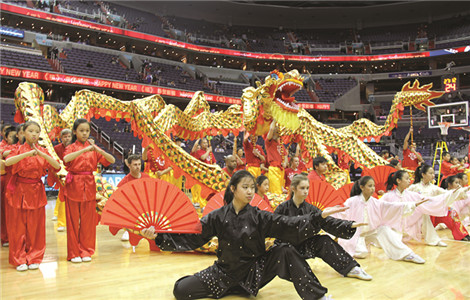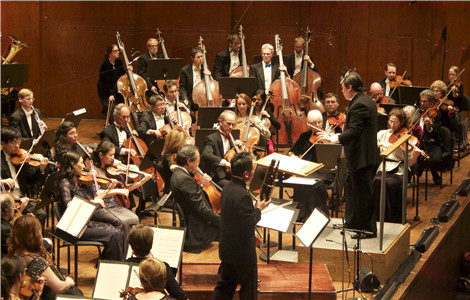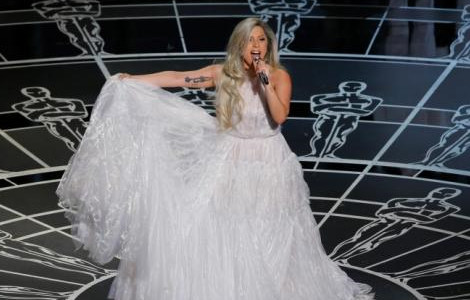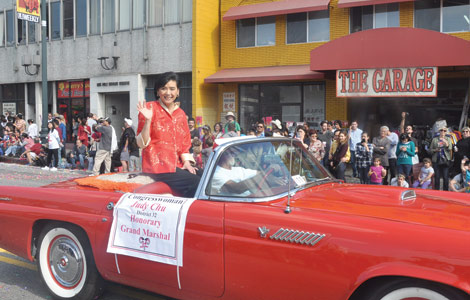Investors' dine and dance format to keep Yabaolu going
Updated: 2015-02-26 07:39
By Erik Nilsson(China Daily USA)
|
||||||||
Beijng's Little Russia has a big problem.
Its Russians are leaving. And they're taking their cuisine with them, as they desert in pace with the decline of Yabaolu's fur market.
While the neighborhood's Russian eateries decrease, some persist under Chinese management.
The area's only Russian-run eateries are the year-old and family-friendly Dacha, and adult-oriented nightclub Chocolate, which has served food as a postscript to late-night clubbing for half a decade. The same restaurateur owns both.
The irony is Dacha (Big Chalet in Russian) also hosts a Ukrainian and a Japanese area with a high-end bar. And it also caters to Italian, Japanese and former Soviet nations' cuisines. Chefs from the respective countries are responsible for national menus.
Yet Russian dishes lead the repertoire, and 10 vodkas and Russian beer dominate the drinks menu. Classics include borscht, capital salad - potatoes, eggs, chicken and cream - and thin-skinned potato dumplings. And, yes, the chicken Kiev is everything decadent that can be expected of deep-fried, cheese-oozing poultry.
Dacha also hosts a kids' room with weekend art classes. And its children's menu offers meals presented as pictures. (Think cucumber slices as wheels.)
Chocolate, on the other hand, stages relatively risque performances at hours when kids snooze and adults booze. The ostentatious club is a solar system of disco balls that twinkle over diners around dusk and dancers in night's darker hours. It's less food and fewer clothes, and more drink and dance, as dawn draws nearer. Yet at any hour, the decor remains louder than the music.
"Russians have dinner (in Dacha), then go to Chocolate and dance," explains the owner's assistant, Damon Kukharenko. "To me, Chocolate isn't a club. It's a big story about Russian and Ukrainian style in Beijing."
It seems running a daytime eatery and nighttime disco is the way to win in today's Yabaolu.
The general manager of eatery Elephant and party-place Mango, Li Baoqi, exposes the distinction with the baring of skin at the late-night venue Mango - both onstage and on the dance floor. Mango opened in 2010, while Elephant has been a local institution since 1995.
Both staffs are Chinese, but cooks train under Russian chefs, Li says. "It's hard to get visas for Russian chefs," he explains.
The 900-square-meter, three-story establishment also hosts nightly shows, often frequented by nearby Elephant's daytime diners.
"Russians like to dance after dinner," Li explains, echoing Kukharenko.
Performances are of modern songs punctuated with WWII-era anthems, with Russian and Ukrainian singers and dancers wearing less the later it gets.
Mango offers 13 brands of vodka, from Gold Anto at 58 yuan ($9.35) to Kauffman Soft for 1,200 yuan. The liquor list is presented in the menu's front, while other drinks are in the back.
The eatery imports such ingredients as fish and red caviar from Russia, "so we can guarantee authenticity", Li says.
In addition to purely Russian food, Mango nods to nearby nations with Azerbaijani kebabs and Ukrainian beefsteak with potatoes, tomatoes, carrots and onions.
Li likens Yabaolu to Chinatown in Russia - in reverse.
"But fewer Russians are coming," Li says. "Many restaurants have closed."
But if Yabaolu's stomach for Russian food seems to be shrinking, much appetite remains.
Perhaps Yabaolu's palate is simply broadening.
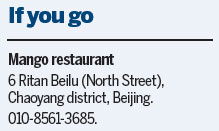
(China Daily USA 02/26/2015 page7)
Most Viewed
Editor's Picks

|

|

|

|

|

|
Today's Top News
Most Chinese forced to return home were living abroad illegally
Obama blames immigration woes on Republicans
US astronauts complete second spacewalk, water reported in helmet
US State Dept calls for cyber security boost
Anbang buys new piece of Manhattan
California here we come: Chinese
Port dispute over, shelves take time to restock
School, firm to link up in cancer fight
US Weekly

|

|

